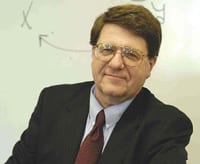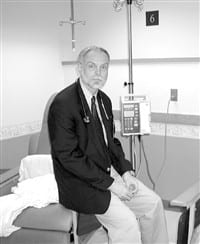A ‘Booming’ Field An Aging Population Spurs Interest In New Master’s Degree Program In Estate Planning
As faculty and administrators at Western New England College School of Law were putting the final plans in place for the start of a new master’s degree program in Estate Planning and Elder Law, they were expecting maybe 10-15 students for the first semester.
Instead, they had more than twice that number of practicing attorneys seek admission for classes that started last fall, and soon found themselves with a sizable waiting list for deferred admission for 2006.
The reason for all that interest, said Fred Royal, a law professor at WNEC and director of the program, or LL.M., as it’s called, boils down to simple demographics — and the business opportunities they present.
As the population ages and the Baby Boom generation heads into retirement, he explained, there is within the legal profession heightened interest in the broad area of estate planning, which includes everything from wills and trusts to wealth-transfer taxes.
This is a field for which many attorneys must seek a higher level of expertise in order to expertly serve clients, said Royal, adding that the part-time program at WNEC was designed specifically for such individuals.
People like Gail Candaras.
The state representative for the 12th Hampden District and a practicing attorney, Candaras, like everyone in the legal field, recognizes a growing need for work in estate planning and elder law. And she understands that those administering such services must be specialists, and to become one, she must “know what she doesn’t know.”
“And that’s quite a bit,” she told The Healthcare News, adding that she intends to close that gap over the next three years, attending one five-hour course a week in subject matter she described as complex and intense.
“This work is very challenging,” she said, noting that the estate planning and elder law have fields have changed considerably since she earned her JD from WNEC 22 years ago. “The government regulations are very complex, and there are new ones to deal with every year.”
These new and changing regulations coincide with the first of what will be tens of millions of 60th birthdays for members of the Baby Boom generation, she said, noting that an estimated 43{06cf2b9696b159f874511d23dbc893eb1ac83014175ed30550cfff22781411e5} of this constituency will eventually need nursing home care.
“And if these people aren’t ready for what will come down the road, if they haven’t properly planned, they could be looking at real trouble,” she said, adding that she and others in the LL.M. program are assembling the tools to help them avoid such a fate.
Coming of Age
As he talked about WNEC Law’s new master’s program and the motivations behind it, Royal said that, in the course of earning their JD, individuals receive a basic understanding of estate planning and elder law, and can certainly provide some of the many services in that realm upon passing the Bar exam.
However, it usually takes years of practice in the field for one to become what is considered proficient, or an expert in that area.
What the WNEC program is designed to do is accelerate that process, or kick-start it, as Royal explained.
“With most attorneys, they take the legal knowledge from law school and develop their expertise through on-the-job training — working with other attorneys, taking continuing legal education courses, and just over time,” he explained. “Through the LL.M., we’re giving people a way to help achieve that desired level of expertise without spending 10 or 15 years developing it.”
The prospects for speeding the process drew students to the WNEC LL.M. program, the only one of its kind in Massachusetts and one of only three in the country, from across the state and beyond. Indeed, the current class of 19 students includes one from Manchester, N.H., several from the Boston area, and one from Martha’s Vineyard.
Such interest from afar will eventually lead to many course offerings online, said Royal, noting that for now, work is restricted to the classroom. There, students, mostly lawyers in their 40s and 50s, have finished the first in a series of required and elective courses.
In that first category are such offerings as Wills and Trusts; Design, Drafting, and Implementation; Fiduciary Admin-istration; Federal Wealth Transfer Taxes; Federal Income Taxation of Estates and Trusts; and Wealth Planning with Insurance Products.
Meanwhile, electives include Advan-ced Issues in Elder Law; Planning for Charitable Transfers, Income Taxation of Pass-Through Entities; and Business and Estate Planning for Owners of Closely Held Business Entities.
The specific nature of those course titles offers evidence of how the field of Estate Planning and Elder Law has become more complex over the years, said Hyman Darling, an Estate Planning specialist with the Springfield-based firm Bacon & Wilson and an instructor in the LL.M. program.
He told The Healthcare News that, moving forward, it will be both the complexity of the work — as well as the sheer volume — that will dictate the need for more specialists in the field. “And in many ways, the explosion is already here.”
Darling, who taught Elder Law 1 this past fall, said that specific field is considered a sub-specialty of estate planning, one that deals in everything from wills to Medicare and Medicaid regulations. And he said that work in that realm requires more than knowing the law — it also entails knowing how to properly apply it and use it.
This isn’t something that can be learned in a semester, he stressed, adding quickly that students in his Elder Law 1 class already know more than they did before they enrolled in that class.
And as their volume of knowledge increases, there will, as Darling told The Healthcare News, be a higher level of service being provided to their clients.
“This is good for everyone — this program will create better lawyers, that’s the bottom line,” he said. “Some of these students now shudder to think of what they were telling people before they took the course.”
Royal agreed, and said that awareness of changing demographics and the need for Estate Planning specialists is driving interest in the LL.M. program — so much so that WNEC Law administrators are already exploring ways to expand it to accommodate more students.
“That’s one of the things on the drawing board,” he said, adding that such efforts will be balanced with faculty members’ desires to keep class sizes small to provide one-to-one learning experiences.
Final Arguments
Which brings Royal to the final course in the LL.M. program — a four-credit project in which students will design and draft a comprehensive estate plan under the supervision of an experienced estate planner.
This capstone course, as it’s called, is designed to take the learning experience well beyond the classroom, he said, and provide real value to the students enrolled.
The actual value of the program extends beyond those obtaining the degrees, however, as Darling explained. By expanding the level of knowledge in the field of Estate Planning and Elder Law, the program can help bring better service to the nation’s aging population.


